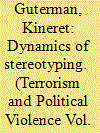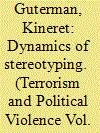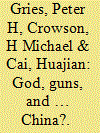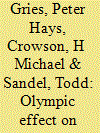|
|
|
Sort Order |
|
|
|
Items / Page
|
|
|
|
|
|
|
| Srl | Item |
| 1 |
ID:
123063


|
|
|
|
|
| Publication |
2013.
|
| Summary/Abstract |
This article considers popular ways of representing terror activists, and the metamorphoses that approaches to representation in the American media have undergone. A part of the article deals with terrorism in the media over time, common stereotypes, and how they affect the representation of Arabs and Muslims. The article then discusses Sleeper Cell (2005), a mini-series which focuses on a Jihad terror group. The article addresses questions including: How are Arabs and non-Arab Muslims portrayed in the series? Can a real change be observed over time in the method of portraying them? Twentieth-century historical considerations precede the pointed topical discussion.
|
|
|
|
|
|
|
|
|
|
|
|
|
|
|
|
| 2 |
ID:
124924


|
|
|
|
|
| Publication |
2013.
|
| Summary/Abstract |
This article considers popular ways of representing terror activists, and the metamorphoses that approaches to representation in the American media have undergone. A part of the article deals with terrorism in the media over time, common stereotypes, and how they affect the representation of Arabs and Muslims. The article then discusses Sleeper Cell (2005), a mini-series which focuses on a Jihad terror group. The article addresses questions including: How are Arabs and non-Arab Muslims portrayed in the series? Can a real change be observed over time in the method of portraying them? Twentieth-century historical considerations precede the pointed topical discussion.
|
|
|
|
|
|
|
|
|
|
|
|
|
|
|
|
| 3 |
ID:
110240


|
|
|
|
|
| Publication |
2012.
|
| Summary/Abstract |
What impact does ideology have on American attitudes and policy preferences toward China? Based on two large N surveys, we first utilize exploratory factor analysis to uncover six distinct American ideological dimensions and two distinct dimensions of attitudes toward China that distinguish between its government and its people. We then utilize structural equation modeling to explore how attitudes toward the Chinese people (i.e. prejudice) and attitudes toward the Chinese government differentially mediate relationships between ideological beliefs, on the one hand, and Americans' China policy preferences, on the other. Results suggest both direct and indirect effects of ideology on policy preferences, with the latter effects being differentially mediated by prejudice and attitudes toward the Chinese government.
|
|
|
|
|
|
|
|
|
|
|
|
|
|
|
|
| 4 |
ID:
095865


|
|
|
|
|
| Publication |
2010.
|
| Summary/Abstract |
This paper explores the impact that increased exposure to China during the two and a half weeks of the Beijing Olympics had on American attitudes towards China. A large N longitudinal survey revealed a significant increase in negative attitudes towards China from the beginning to the end of August 2008. Statistical analysis revealed no dominant explanation for this change, however. Instead, personality (openness), ideology (social dominance orientation and right wing authoritarianism), and media exposure each had a small impact on changing attitudes. Further research (including a follow-up experiment manipulating the valence of media coverage of China) suggested both the possibility of an 'efficiency effect', whereby China's very success in both hosting and competing in the Olympics generated increased American anxiety about China, and a 'cheating effect', whereby stories about underage Chinese gymnasts and deception (e.g. lip synching while another child actually sang during the Opening Ceremonies) diffused broadly through social networks, uniformly and negatively impacting American attitudes towards China.
|
|
|
|
|
|
|
|
|
|
|
|
|
|
|
|
|
|
|
|
|